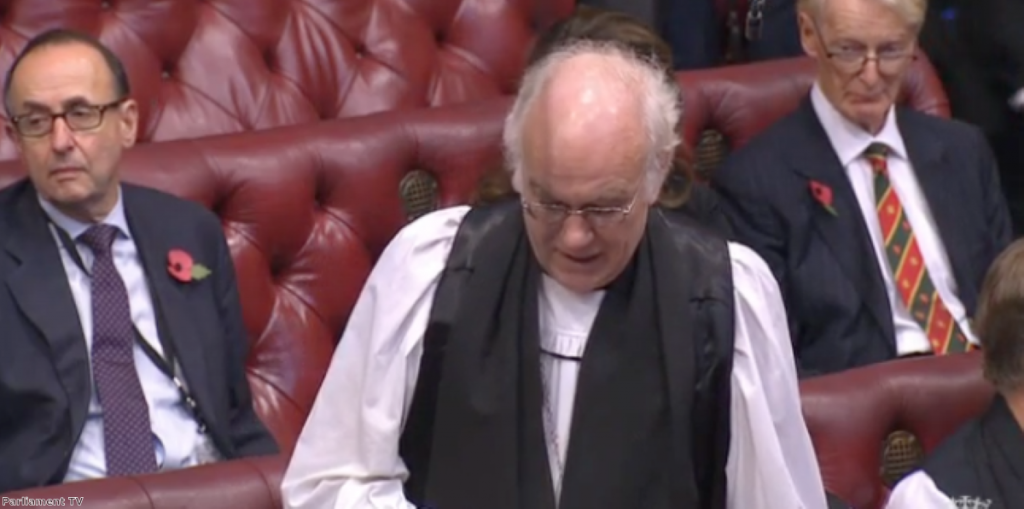Peer to peer: House of Lords debate ‘squalid’ world of online porn
It's not often a debate is launched by a person who admits to knowing absolutely nothing about it, but that was the case in the House of Lords today.
The Bishop of Chester launched the session with a speech making it very clear that he had no personal knowledge of the subject.
"I will avoid an echo of the confessional, but I can say my first-hand experience of pornography is very limited," he told the House.
"Of the range of vices available to me I've been tempted by most but not in any significant way by pornography."


In any other arena, somebody confessing to complete ignorance on a subject would immediately be asked to make way for somebody else, but not in the House of Lords.
Quoting DH Lawrence, he said he was very worried about the impact of people watching "dirty squalid sex," on people's spiritual health. He added that porn was putting a strain on family relationships and creating a "neurological trap" which pulled viewers into wanting to seek ever-more depraved images.
My favourite moment from today's House of Lords debate on porn. https://t.co/4h20Oi6iFq
— Adam Bienkov (@AdamBienkov) November 5, 2015
However despite this, he was apparently not keen on an outright ban on people watching porn.
"In the internet age this is unlikely to be successful even if it is attempted," he explained.
Drawing on his biblical knowledge, he went on: "It used to be said that in the Old Testament if something is banned it's going on quite widely"
He was joined by Conservative peer Lord McColl, who claimed that the prevalence of online porn was shrinking the brains of regular users.
Baroness Shields says she will get back to Lord Farmer with the latest statistics on anal sex injuries.
— Adam Bienkov (@AdamBienkov) November 5, 2015
After a speech from one Labour peer downplaying the impact of porn, Farmer angrily intervened to claim that "the majority of 11-year-olds are watching the most appalling violent pornography".
Quite where he got this figure from wasn't clear, although perhaps he has seen some early results from Theresa May's new surveillance regime.
Other peers were more worried about the impact of porn on people's physical health. Lord Farmer told the House he had read about an alarming rise in anal sex injuries in the home counties.
"I have read about one family doctor working in a leafy suburb in the home counties – not in a concrete jungle in the inner city – treating greater numbers of teenage girls suffering from after effects of frequent anal sex, like incontinence."
Farmer was determined to get to the bottom of the problem.
"I would be grateful if the noble Baroness, the minister, could ask the Department of Health if there is data on the prevalence of these injuries."
The Baroness later confirmed that she would get back to him with the latest statistics.
Lord Farmer: "Internal injuries can be caused by sex acts inspired by young men's access to porn" pic.twitter.com/RvZPctHaQp
— Adam Bienkov (@AdamBienkov) November 5, 2015
Others were more circumspect about the issue. Baroness Howe thanked the Bishop of Chester for raising the debate and welcomed "the opportunity provided by the debate to stand back and look at pornography". An opportunity which apparently the Bishop himself has yet to take up.
Lord Cormack was similarly reflective, informing the house that not all erotic images were bad. He had after all recently seen "an extraordinary exhibition of erotic Japanese prints" at the British museum.
Lord Cormack: "The British museum recently had an extraordinary exhibition of erotic Japanese prints." pic.twitter.com/dmVSoa5Vcq
— Adam Bienkov (@AdamBienkov) November 5, 2015
A rare note of self-awareness came from academic psychiatrist Baroness Murphy who urged her colleagues "not be too virulent about an issue we hardly know anything about," adding that enjoyment of porn and erotic fiction such as Fifty Shades of Grey was now mainstream.
Responding to Murphy's point in his concluding remarks, The Bishop of Chester insisted that his lack of knowledge should not stop him from having an opinion.
"Baroness Murphy did say it is an issue we hardly know anything about," he began.
"[However] does the chicken or the egg come first? When you're looking at a chicken omelette, that question becomes academic and you have to try and answer it," he explained.
Responding to points made during the debate, government culture minister Baroness Shields said they remained committed to restricting access to online porn.
"The online world needs to be brought in line with the offline world," she insisted.
However, she admitted this would be difficult.
"Whatever solutions we put in place, some will fail. Young people are smarter than us," she insisted.
After watching today's debate, it was hard to disagree.












